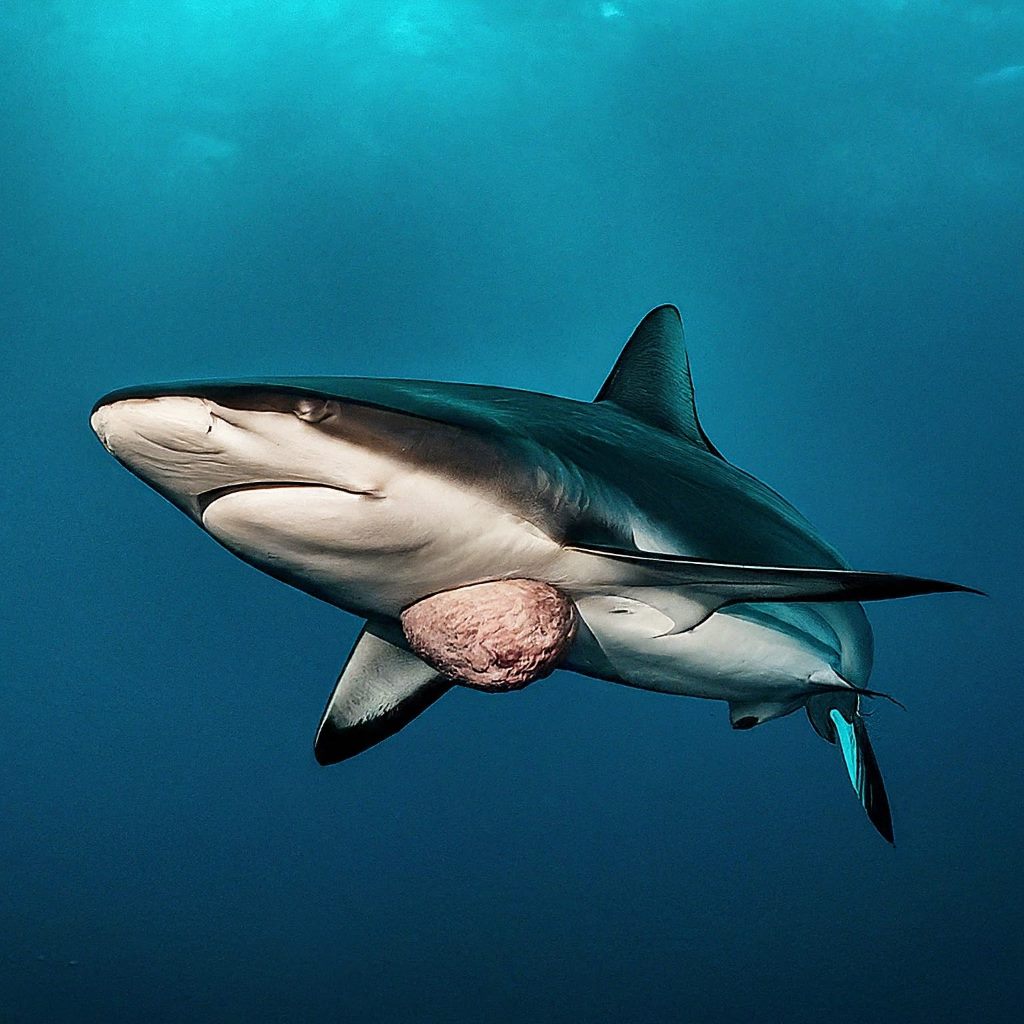Sharks, as ancient and diverse marine creatures, are not exempt from health and well-being challenges. Despite their reputation as apex predators, sharks can suffer from various diseases affecting their physiology. In this detailed article, we will explore a range of shark diseases, including the uncommon neoplastic disease, oral fibropapillomas, hepatic adenomas, intrahepatic cholangiocarcinoma, testicular mesothelioma, melanoma, lymphosarcomas, spinal deformities, and fatty liver disease.
1) Uncommon Neoplastic Disease in Sharks
Neoplastic diseases, characterized by the abnormal growth of cells leading to tumor formation, are relatively uncommon in sharks. Unlike in some terrestrial animals, cancer is not a prevalent cause of morbidity or mortality in shark populations.
2) Oral Fibropapillomas
Description: Oral fibropapillomas are benign tumors that often affect the oral cavity of sharks. These growths, composed of fibrous and connective tissues, can interfere with feeding and normal mouth function.
Occurrence: While not as common as in some sea turtle species, oral fibropapillomas have been documented in various shark species.
3) Hepatic Adenomas and Intrahepatic Cholangiocarcinoma
Description: Hepatic adenomas are non-cancerous tumors affecting the liver, while intrahepatic cholangiocarcinoma is a malignant tumor originating from the bile ducts within the liver.
Occurrence: These liver-related diseases have been observed in sharks and can impact the organ’s function, potentially leading to systemic health issues.

4) Testicular Mesothelioma and Melanoma
Description: Testicular mesothelioma is a rare form of cancer affecting the testicles, while melanoma is a type of skin cancer caused by the uncontrolled growth of pigment-producing cells (melanocytes).
Occurrence: While uncommon, these diseases have been documented in sharks, emphasizing the complexity of health challenges they may face.
5) Lymphosarcomas
Description: Lymphosarcomas are cancers that affect the lymphatic system, leading to abnormal growth in lymphoid tissues.
Occurrence: These cancers have been identified in sharks, contributing to our understanding of the various cancer types that can impact these marine predators.

6) Spinal Deformities in Captive Sharks
Description: Spinal deformities, often resulting in abnormal curvature or structure of the vertebral column, are commonly reported in captive sharks.
Occurrence: The conditions in captivity, including limited space and specific environmental factors, can contribute to spinal deformities, impacting the overall health and movement of sharks.
7) Fatty Liver Disease
Description: Fatty liver disease is characterized by the accumulation of fat in the liver cells. In sharks, their livers are naturally fat-laden, allowing them to achieve near-neutral buoyancy.
Occurrence: While not a pathological condition for sharks, the fatty nature of their livers is a unique adaptation that contributes to their buoyancy and overall physiological balance.

8) Common Bacterial and Fungal Infections
Aside from neoplastic diseases, sharks also face bacterial and fungal infections. These infections can have various manifestations, including sepsis, dermatitis, branchitis, and enteritis.
- Bacterial Infections:
- Bacterial infections are relatively common, constituting 15% of reported cases.
- Sepsis, dermatitis, branchitis, and enteritis are among the bacterial infections affecting sharks.
- Fungal Infections:
- Fungal infections, though less prevalent, include dermatitis, hepatitis, and branchitis.
- These infections can impact the skin, liver, and respiratory systems of sharks.
Conclusion
The health of sharks, despite their reputation as powerful predators, is a complex and multifaceted aspect of their biology. From neoplastic diseases and oral fibropapillomas to hepatic adenomas, melanomas, and spinal deformities, sharks, like all living organisms, can face a range of health challenges. Researchers and marine biologists play a crucial role in understanding, documenting, and mitigating these diseases to ensure the conservation and well-being of shark populations in our oceans.
Related FAQ on Shark Health
1. What makes sharks immune to diseases?
- Sharks are not immune to diseases, but they display a remarkable resistance. Their robust immune systems, evolved over millions of years, contribute to their ability to withstand various pathogens. However, sharks can still experience health challenges, including infections and neoplastic diseases.
2. Why are sharks impervious to cancer?
- Sharks exhibit a lower incidence of cancer compared to some other animals. While they are not entirely impervious to cancer, their unique biological factors contribute to a reduced risk. The study of shark genomes and proteins provides insights into their natural cancer resistance. Research is ongoing to unravel the mechanisms that make sharks less susceptible to cancer.
3. Can sharks get cancer?
- Yes, sharks can get cancer. While they have a lower susceptibility compared to many animals, they are not exempt from cancerous conditions. The exploration of cancer in sharks contributes to a broader understanding of the disease across different species. Unlike certain exceptions like the naked mole rat, sharks are not inherently immune to cancer.
4. Do sharks get diseases?
- Sharks can contract diseases, and their level of resistance is notably high. Their longevity as a species, spanning millions of years and surviving multiple extinction events, reflects their resilience. While not entirely immune, sharks’ ability to resist diseases is a testament to the intricate adaptations developed during their evolutionary journey.
5. Do Sharks Get Infections?
While wild-caught and captive sharks may be susceptible to bacterial and transmissible diseases, recent findings propose intriguing aspects of their biology that contribute to infection resistance. The specialized ultrastructure of shark skin or innate immune properties may play a role in preventing infections.
6. Do Sharks Carry Rabies?
No, sharks do not carry rabies. Rabies is a viral disease that affects mammals. Sharks, being fish, do not fall within the mammalian category. Rabies is not found in non-mammalian species, including birds, snakes, and fish. Therefore, sharks cannot contract rabies and pose no risk of transmitting this viral infection to humans or other animals.
